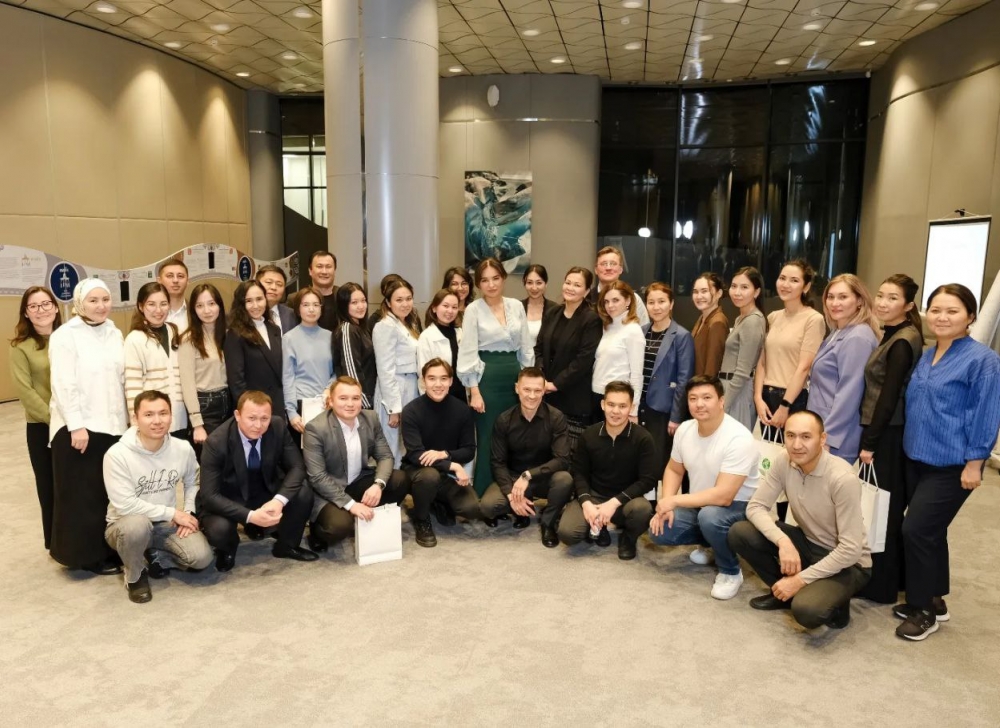




An internal training session was conducted at the Central Asian Institute of Environmental Research (CAIER) for employees representing a consortium of companies that have aligned with the United Nations Global Compact.
Specialists from the charitable foundation "Sabi," the CAIER Institute, the bio-boutique Telli, Shoqan Walikhanov Private School, and the cosmetic production plant Telli Ondyrys took part in the training seminar.
All these enterprises were founded by the ecologist and benefactor Asel Tasmagambetova. They conceived and function as socially responsible and environmentally friendly enterprises, adhering to the principles of sustainable development and ESG standards.
During the inauguration of the event, Asel Tasmagambetova delineated the inception stories of each entity, elucidating the rationale behind their chosen spheres of operation, and how, despite difficulties and skepticism from colleagues in the professional community, they managed to implement numerous projects that brought about systemic changes in education, medicine, ecology, and culture.
Through sustained efforts over the years, achievements include the addition of the Caspian seal to the Red Book of Kazakhstan, the inception and implementation of a myriad of nationwide philanthropic initiatives, the establishment of pioneering educational institutions, and the creation of an environmentally pristine production plant. Notably, these ongoing projects continuously evolve and refine themselves, drawing insights from global best practices.
Commencing the instructional seminar, the organizers of the event – the ESG Consulting Department of CAIER – Aigerim Ospanova, the department head, and Lyazzat Kaibaldiyeva, a senior ESG expert, provided a platform for each company to narrate their experiences, articulating how they meticulously outlined objectives, undertook strategic initiatives, and achieved tangible outcomes across their operational trajectories.
The charitable foundation "Sabi" has been operating since 2002 and is one of the first organizations in Kazakhstan. The foundation began its work with small charitable projects aimed at helping children's homes. But today, after many years, the organization has implemented dozens of systemic programs to assist socially vulnerable populations and people with special needs. The foundation has funded the education of hundreds of talented Kazakhstani children, built advanced pediatric emergency surgery units in 5 regions of Kazakhstan, and is constructing schools, children's homes, inclusive playgrounds, and robotics centers across the country.
The CAIER Institute, in turn, was established in 2012. Over 11 years of operation, the Institute has evolved from a small scientific organization into one of the leading independent environmental research institutes in Kazakhstan and Central Asia. CAIER houses a unique laboratory equipped with state-of-the-art high-tech machinery. The Institute has developed several patented innovations in water purification and the production of construction materials from stabilized soils. The Institute's building has been constructed adhering to all environmental standards and possesses an international LEED certification.
The bio-boutique Telli celebrated its 15th anniversary this year. Telli is not just a store but a company that stands as one of the pioneers in Kazakhstan, having conducted extensive educational outreach. It has instilled awareness in the Kazakhstani consumer regarding the consumption of natural cosmetic products that are environmentally friendly, not tested on animals, and devoid of harmful components detrimental to health.
Fifteen years ago, the bio-boutique Telli embarked on its journey as one of the prominent homeopathic pharmacies not only in Kazakhstan but also in Central Asia. Its repository of homeopathic remedies has been curated based on recommendations from leading Ukrainian physicians and currently encompasses over 5000 names of the most sought-after remedies.
Today, Telli not only retails leading global environmentally friendly cosmetic brands but also produces its own lactose-free ice cream and solid soap using natural oils. Additionally, in the future, it plans to expand its range of in-house manufactured products.
Shoqan Walikhanov Private School was established in 2020 and stands as the singular green institution in the CIS to possess the international environmental LEED certification.
Currently, the school accommodates over 900 students. Its fundamental principle revolves around providing Kazakhstan's students access to high-quality education, including pathways to enter the top 20 international universities. Exceptional students are awarded scholarships, while graduates admitted to these top 20 international universities have their tuition fully funded by the school's founders.
The school's operations align entirely with the principles of ESG and sustainable development. It has implemented energy-saving, heat-conserving, and water-efficient devices, alongside the introduction of a waste segregation system.
The school has become a venue for hosting a series of environmental events, including the Republican Environmental Forum for young scientists. This forum serves as a platform where children from various regions of the country showcase their unique and innovative ecological research endeavors.
The Telli Ondyrys factory is the first in Kazakhstan designed in compliance with all ISO 22716 (GMP) requirements. The facility is capable of producing high-quality and environmentally friendly cosmetic products for any client. It incorporates a multi-stage water purification system. Telli Ondyrys has set ambitious goals to develop an environmentally clean product that will be in demand not only in the Kazakhstan market but also in international markets.
During the training seminar, participants were presented with an instructional session where the employees from the ESG Consulting Department of CAIER elucidated the principles of sustainable development and ESG, as well as Kazakhstan's current progress in achieving the UN Sustainable Development Goals (SDGs). They also discussed the principles, objectives, and goals that companies joining the United Nations Global Compact must adhere to.
The event organizers proposed to the participants the consolidation of acquired knowledge through a business game, where practical tasks were simulated. These tasks necessitated solutions employing the principles of sustainable development, ESG, as well as the UN Sustainable Development Goals.
The employees from various companies approached problem-solving creatively. Some teams not only identified pathways to resolve the issue and devised a development strategy but also managed to craft a viable startup for producing environmentally friendly clothing within a short span of time.
This event served as another educational initiative within CAIER's systematic educational outreach framework for implementing principles of sustainable development, ESG, and the UN Sustainable Development Goals. These initiatives are orchestrated by the institute specifically for companies in Kazakhstan and Central Asia.
